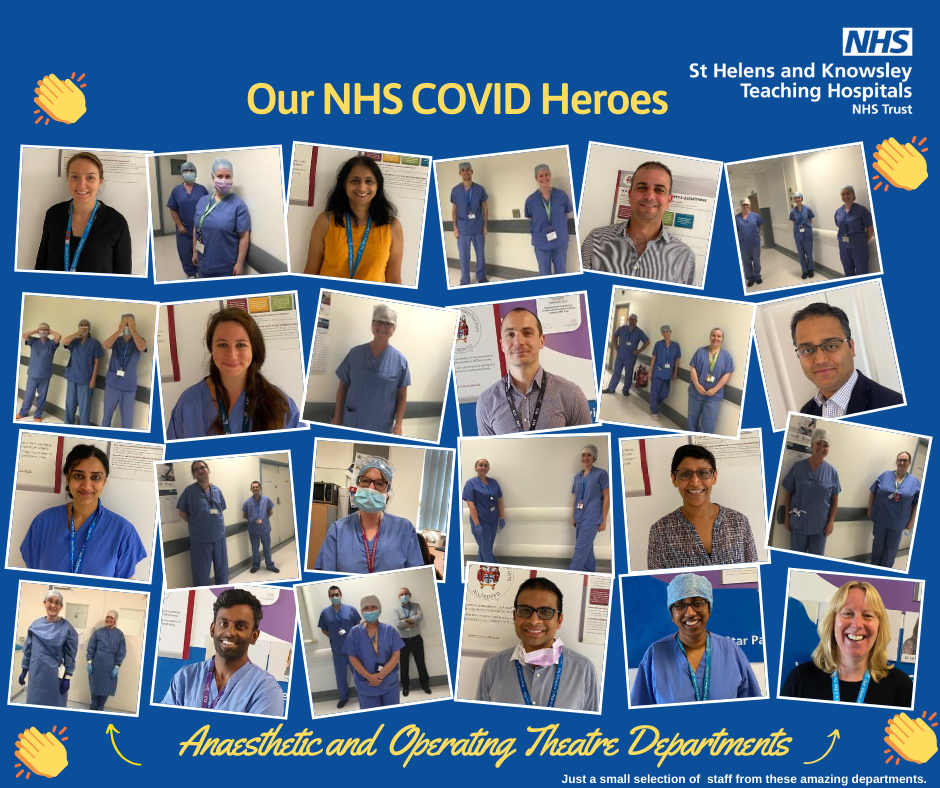Today’s staff update is below:
- PPE reminder
- Risk assessments – male employees & all staff over the age of 60
- Be part of the Covid-19 vaccine trials
- NHS Covid Heroes
PPE REMINDER
Staff are reminded that the following PPE guidelines must continue to be followed for those providing direct patient contact:
- Staff in direct contact with patients should wear a surgical mask, apron, gloves and eye protection (goggles or visor).
Masks are to be changed every 3 hours or when moving from one clinical department to another, or if it becomes damaged or soiled.
Gloves and aprons are to be changed after each patient contact or episode of patient care.
Re-usable goggles and visors should be cleaned with 1000 parts per million chlorine (e.g. Chlorclean). - Staff working in ICU/HDU, ED Resus, Wards with Non-Invasive Ventilation and operating theatres with aerosol generating procedures (AGP), should wear FFP3 mask, gloves, gown, apron and eye protection (goggles or visor).
FFP3 Masks are to be changed every 6 hours or when moving from one clinical department to another.
Gloves and aprons are to be changed after each patient contact or episode of patient care.
Gowns are to be changed when moving from one clinical department to another.
Re-usable goggles and visors should be cleaned with 1000 parts per million chlorine (e.g. Chlorclean). - Staff outside of ICU/HDU, ED Resus and operating theatres, carrying out aerosol generating procedures (AGP) e.g. CPR on a general ward, must wear an FFP3 mask, gown, gloves and eye protection (goggles or visor).
All PPE must be changed after each patient contact or episode of patient care.
Re-usable goggles and visors should be cleaned with 1000 parts per million chlorine (e.g. Chlorclean). - Staff working in Delivery Suite/home births should wear a surgical mask, gown, gloves, apron and eye protection (goggles or visor).
Masks are to be changed every 3 hours or when moving from one clinical department to another, or if it becomes damaged or soiled.
Gloves, gowns and aprons are to be changed after each patient contact or episode of patient care.
Re-usable goggles and visors should be cleaned with 1000 parts per million chlorine (e.g. Chlorclean).
Please ensure that all equipment is disposed of in the ORANGE waste bags/bins provided, and you follow the appropriate hand hygiene procedures.
To access supplies, please speak to your line manager.
PHE’s detailed guide on what protective equipment is required across the Trust can be found here:
In a hospital setting: https://covid.sthk.nhs.uk/wp-content/uploads/2020/04/Recommended-PPE-for-healthcare-workers-by-secondary-care-clinical-context-3.4.20.pdf
(password: STHKcovid19)
Primary and Community: https://covid.sthk.nhs.uk/wp-content/uploads/2020/04/Recommended-PPE-for-primary-outpatient-and-community-care-by-setting-poster-3.4.20.pdf
(password: STHKcovid19)
RISK ASSESSMENTS – MALE EMPLOYEES & ALL STAFF OVER THE AGE OF 60
In light of emerging scientific evidence, male staff and those age 60+ are now included in the category of those requiring a risk assessment.
The staff in these categories will be required to complete the COVID Risk Assessment excel form which has been developed to allow managers to work with each of their staff members to ensure that they can work in a COVID secure environment:
https://covid.sthk.nhs.uk/staff-risk-assessments/ (password: STHKcovid19)
Where this is not feasible, then the necessary control measures and an action plan with adjustments or additional PPE should be put in place, to safeguard them against Coronavirus.
Each question and response has an associated score which will allocate the staff member a risk rating of low, moderate or high depending on their health conditions, gender, age and ethnicity. Whilst it highlights a number of known factors, the score is not clinical, therefore if you are in any doubt you should contact Health, Work and Wellbeing or your HR Business Partner for further advice and guidance.
We are required to submit our compliance with this request to NHS England by 31st July 2020.
Please see above link to the Risk Assessment Form along with a Guidance document on how to complete the assessment. Once completed please return to: covidstaff@sthk.nhs.uk
A REMINDER ALSO, THAT RISK ASSESSMENTS FOR SHIELDING STAFF SHOULD BE RETURNED BY TUESDAY 28TH JULY 2020.
BE PART OF THE COVID-19 VACCINE TRIALS
Our region is at the heart of global efforts to find a Covid 19 vaccine. Now your help is needed to find more volunteers to register for vaccine research.
The National Institute for Health Research is urging people to sign up and be part of the trials that can help prevent a second wave of the virus and protect the most vulnerable in our society.
Vaccines are the most effective way to prevent infectious diseases. They’re designed so they do not give people the infection they’re protecting against.
Research is the only way to find out which vaccines will work and researchers need people to take part in their studies so they can find out which possible new vaccine works best.
To sign up or for more information, click here: https://www.nhs.uk/conditions/coronavirus-covid-19/research/coronavirus-vaccine-research/
NHS COVID HEROES
Today’s heroes, are the incredible Anaesthetic and Operating Theatre Departments.
The teams were instrumental to the Trust’s ability to react swiftly and safely to the increasing demands of the pandemic.
In less than a week, the operating theatre team created an additional 16 beds of critical care capacity in Recovery, and without hesitation staff moved from theatres to ICU to care for our most vulnerable patients.
They helped to train redeployed staff, converted St Helens day case theatre to one that could undertake major cancer work, all while maintaining normal emergency theatre workload and staffing 3 elective theatre lists.
Anaesthetic colleagues changed their working roster, showing great flexibility to assure we had the appropriate level of senior medical cover for the increased critical care capacity.
The safety of both patients and staff has been paramount and the teams have worked tirelessly to maintain the highest quality of patient care during these unprecedented times.
